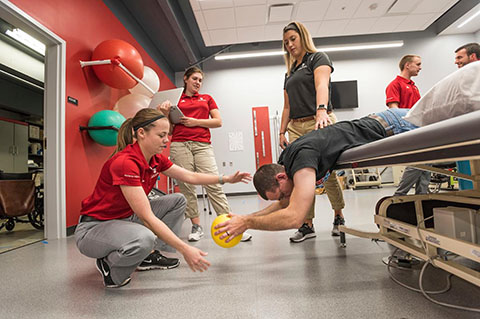
Physical therapy students on schedule to graduate after COVID-19
USD’s physical therapy program is making sure students learn the necessary skills while staying on track to graduate despite transitioning to online learning.
USD’s physical therapy program is accredited by the Commission on Accreditation in Physical Therapy Education (CAPTE). The commission establishes the minimum standards and elements of knowledge PT students need to graduate.
Patti Berg Poppe, professor and chair of the physical therapy department, said third-year students were in their fifth and final clinical rotation when USD moved to remote learning options.
CAPTE communicated minimum criteria for clinical education completion including the number of weeks, level of assessed competence on a clinical performance instrument and diversity of collective clinical experiences, Poppe said.
“Because USD Physical Therapy curriculum well exceeds minimum expectations,” Poppe said in an email interview with The Volante. “Our students were well-positioned to easily meet these expectations.”
Poppe said to minimize health risks to the students and those educating them, the department chose to pull third-year students from clinical experiences.
“These students exceeded minimum expectations set by our accrediting agency,” Poppe said. “They will graduate on a typical timeline.”
Poppe said faculty have been working to generate videos of hands-on techniques and skills and voice-over audio presentations to support asynchronous formats.
The department has also used synchronous sessions for active learning sessions, guest presenters, structured question/answer and review sessions and demonstrations.
“Our oral research presentations were moved to a virtual showcase session and will be distributed to clinicians and program stakeholders through ZOOM links,” Poppe said.
Some courses require students to demonstrate clinical reasoning skills with case patients or manual skills which can’t be delivered remotely with the reassurance the student is competent.
Poppe said for these courses students will be given grades of incompletes. The department is working on a timeline for hands-on intensive instruction.
Faculty has been working with the School of Health Sciences Dean and the Dean of the Graduate School and Academic Affairs leadership on solutions for shifting courses and moving clinical education to a later date.
“These efforts have been made to improve the likelihood of an on-time graduation for both our first-year and second-year students,” Poppe said.


